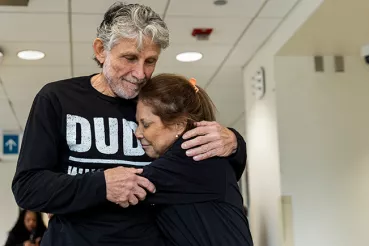Like most close-knit mother and daughter duos, Frances Santiago and her daughter, Jessica, enjoy doing a lot of things together. Whether it’s binge-watching “The Office,” exercising or shopping, the two enjoy each other’s company.
And here’s something they do together that’s made their bond even stronger: They get infusions together twice a month to help protect them from the disease they both share — Fabry disease.
Fabry disease is a rare genetic disease that can affect the kidneys, heart and skin. Because it’s familial, it’s also affected their family — with many of their relatives either suffering from severe side effects or dying from the disease. But with the help of the Infiltrative Cardiac Disease Clinic at Rush, Frances and Jessica are being proactive about their health and doing everything they can to live normal lives.
Taking early action
Frances, 51, knew she had the disease at the age of 18. Jessica, 26, was in elementary school when her mom took her to a hospital for testing to see if she carried it. Throughout their lives, they’ve both seen a variety of doctors, but since none specialized in the disease — and neither Frances nor Jessica were suffering from any outward symptoms — they didn’t know what steps to take next.
And then they met cardiologist Dinesh Kalra, MD.
Frances first attended his educational lecture about the disease in 2019. Dr. Kalra treats 30 patients with the disease and because it’s familial, most are family members. After the lecture, Dr. Kalra encouraged Frances to make an appointment for her and Jessica.
And she did. Jessica said Dr. Kalra was “instantly different” than any other doctor she’s ever met.
“He had information about the disease and could talk to me about the symptoms, even small things that I would overlook,” said Jessica. “Since he helps other people who have the disease, we weren’t guinea pigs. He encouraged us to start taking precautions now.”
Personalized treatment
The current state of treating the disease is rapidly changing — and there’s hope that someday, gene therapy could offer a solution. But for now, the most common form of treatment is either a pill every other day (this works for 1 out of 3 patients) or infusions (this works for all Fabry patients).
The duo started infusions in November of 2019. The infusions supplement an enzyme they are both deficient in, called alpha-galactosidase. They go twice a month and re-arrange each other’s schedules to make sure they can go together. Twice a year, they have check-ups with Dr. Kalra and his team.
Jessica’s treatment focus is on her kidneys and Frances’s focus is on kidney and heart. Both are glad they get to be there with each other for their infusions.
“It’s great because we get to be in the same room and sit next to each other,” said Frances. “We take care of each other.”
Frances is especially grateful that she’s doing the treatments now — and that Jessica is starting her’s at a young age.
“I didn’t do the infusions right away because all my results had been normal,” said Frances. “I kept thinking that I didn’t need it — or maybe I’d do it later. But the longer you wait to get treatment, the more damage it can do to your body. If I would’ve started the infusions earlier, maybe I wouldn’t have heart damage.”
Starting the right treatment at the right time
Dr. Kalra recommends seeing a specialist for anyone who has a genetic disease. Specialists can recommend family screenings, advice on when to start treatment and offer genetic counseling to women who want to have children. Getting care at a large academic medical institution is a bonus for patients because they have access to a team of doctors, along with the opportunities to participate in clinical trials.
“A specialist will know what to look for, the intricacies of the disease and how to identify it,” said Dr. Kalra. “A specialist is going to have their antenna up on how to diagnose a disease, even if the symptoms seem non-specific.”
Dr. Kalra adds that sometimes, people with a genetic disease have a stigma or feel guilty they’ve passed it along to their children. They feel like they can’t do anything about it. But he wants patients to know that’s not the case — and to look to Frances and Jessica as an example.
“Once you start treatment early, you can avoid complications of the disease,” said Dr. Kalra. “Don’t be shy, seek out knowledge and empower yourself to get the treatment you need.”



